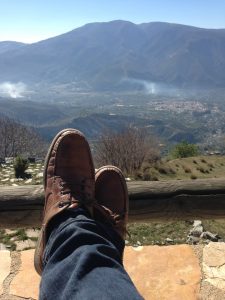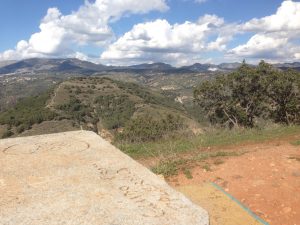Author: Garrett Gilmartin
Location: Granada, Spain
Pronouns: He/His/Him

When traveling abroad timing is an important aspect to account for. Yes, time zones are different when traveling, but there’s much more to timing than knowing what time it is. Everyone has heard the phrase “time it is relative” before. Generally, when people say this they are talking about how time is a construct of the human mind to be able to measure, at exactly what moment we should be at a certain place or where we were or are in past, present, and future. This may be true but I have found that timing is not just a universal idea, rather it is also an aspect of culture.
For example, a large aspect of Spanish culture is food, more specifically tapas. Tapas originate from when Spanish farmers were out in the fields working all day and carried wine skins and some sort of snack like, jamón, or cheeses. They carried wine skins and food to snack and stay energized while they worked all day. They would snack specifically before lunch and dinner. This has now evolved into the idea of tapas, where families and friends go out before a main meal and share small plates while having a drink of some sort. Now, what this has to do with time is there is a right time to eat tapas. Lunch here in Spain is a little bit later than what time we might eat lunch in the United States. Some host families here serve lunch around one or two, whereas my host family serves lunch around three or four in the afternoon. So, it is important to know that when in Spain tapas begin before lunch around noon or one and continue until about five which is when some places stop serving tapas until later. After about seven in the evening most places are open and serving tapas again. This is probably the busiest time for tapas as people are getting off of work or out of class and are going out with friends or colleagues or their family to share some drinks and talk about the day right before dinner which, in Spain, is around nine or ten at night. Basically, when in Spain it is important to familiarize yourself with the local tapas places and their open hours because it will be a large part of your stay.

Another important time to know in Spain is Siesta time! Siesta is a few hours in the afternoon when people take time to relax or maybe take a nap. Unless you have class or work it doesn’t matter what time you choose to take your Siesta nap, however, if you are planning to grab food or go to the store you have to schedule some of those activities around Siesta time because many stores and some restaurants close down for a couple of hours during the afternoon. So, when in Spain schedule nap time and plan activities like hikes or walks in the afternoon to avoid trying to go somewhere that is closed during siesta.
Lastly, there is what I call Spanish time. It’s just like Island time. People who live in warmer climates like the Caribbean or Spain tend to move a little slower and have a relaxed state of mind. This is absolutely true about Granada. If Granada had an official phrase it would be either “Tranquila” or “No pasa nada”(both basically mean no worries). In addition to constantly telling people to chill the people of Granada are late to everything. My professors are all constantly five minutes late to class. When people plan to meet up they usually end up meeting ten or twenty minutes after they had planned. Essentially, if you ever go to Spain do not expect anyone to be on time.
Spain in my opinion is all about going with the flow. Time spent relaxing and without worry seems to be the preferred mindset of the Granadan people. What I learned from this is to not waste my time worrying and to just go with the flow of life, however do be aware that it’s ok to be a little late as it is part of the culture, but don’t miss class, flights, or events because you’re feeling like lying in bed a bit longer. If you go to Spain, enjoy the relaxation but don’t miss out.

Leave a Reply